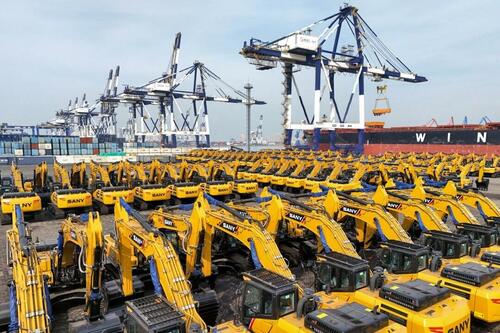
A Quiet Grip On Africa
Authored by Tamuz Itai via The Epoch Times,
Africa, a continent rich in resources and resilience, is a mostly silent battleground in a geopolitical contest. While global attention fixates on the Middle East, Ukraine, or Taiwan, China, under the direction of the Chinese Communist Party (CCP), is reshaping Africa’s future through loans, infrastructure, and control of critical minerals. This isn’t just Africa’s story—it’s a test case for a global model that trades sovereignty for dependency. Democratic nations must counter with partnerships that prioritize African agency, learning from past mistakes to avoid repeating them.

To understand China’s grip, we must revisit Africa’s scarred past. European colonial powers plundered resources and drew arbitrary borders, leaving deep wounds. Post-independence in the 1960s, Cold War rivalries destabilized Africa. The U.S. backed dictators like Mobutu Sese Seko in Zaire (now the Democratic Republic of Congo) and Siad Barre in Somalia to counter Soviet influence, undermining democracy. Debt crises in the 1970s and 1980s, worsened by International Monetary Fund austerity, stifled growth. From the 1980s to 2000s, Western aid dwindled as conflicts like Rwanda’s genocide raged, sidelining Africa. This vacuum enabled China’s rise, starting with the 2000 Forum on China-Africa Cooperation (FOCAC), offering loans without Western-style conditions.
Exploiting this neglect, China, under CCP direction, launched a strategic offensive. Its state-owned banks have extended $170 billion in loans since 2000. In Kenya, they funded the $3.6 billion Nairobi-Mombasa Railway; in Ethiopia, the $4.5 billion Addis Ababa-Djibouti Railway. Zambia’s $2 billion Kafue Gorge Lower Hydropower Project, 85 percent Chinese-funded, led to a 2020 debt default. The CCP’s playbook includes loans, contracts for Chinese firms using Chinese labor, access to resources, surveillance-enabled digital infrastructure, and elite capture through lucrative deals for political allies. In Uganda, Huawei aided government surveillance of opposition figures. In Addis Ababa, the Chinese-built African Union headquarters sent data to Shanghai servers nightly from 2012 to 2017.
Africa’s critical minerals are central to this strategy. The DRC produces 80 percent of global cobalt, with Chinese firms controlling 72 percent of its mines, like Tenke Fungurume. Zimbabwe’s lithium powers China’s battery production. Copper from Zambia and the DRC supports renewables. Manganese from South Africa and Ghana, 58 percent Chinese-imported, is vital for steel. Rare earths from the DRC and Tanzania underpin tech and defense. China, controlling 60 percent of global mineral production and 85 percent of processing, locks in supply chains for EVs, solar panels, and military technology. In 2020, Chinese media threatened to cut rare earth exports to U.S. defense contractors, a tactic repeated in recent trade tensions, highlighting global dependency.
China’s narrative—“we were colonized too, we understand your struggle”—resonates with African leaders wary of Western hypocrisy. Beijing leverages its history of resisting foreign domination to build trust, offering no-strings loans, unlike Western demands for reforms. In Zimbabwe, sanctioned by the West, President Mnangagwa praises China’s $2.7 billion investments in mining and energy as “non-intrusive.” Ethiopia’s late Prime Minister Meles Zenawi lauded China’s model, securing $7 billion for railways and dams. Yet, this narrative masks costs that Africans increasingly challenge.
Africans are not passive, actively resisting China’s grip. In the DRC, workers at Tenke Fungurume protest low wages and hazardous conditions, demanding fair labor. Similarly, Kenyan activists, led by Okoa Mombasa, sue over Huawei’s “safe city” surveillance infringing privacy. Meanwhile, Zambia’s President Hichilema renegotiates $6 billion in Chinese debts, prioritizing transparency. Ghana’s 2017 crackdown deported 4,500 Chinese illegal gold miners. Nigeria’s tech startups, like Paystack, and Ethiopia’s women-led textile firms, supported by UNIDO, push for local economic control, demanding leaders prioritize citizens over foreign interests.
As Africa resists, the free world responds with renewed urgency. The Trump administration is shifting U.S. strategy toward investment-led, trade-driven growth, launching commercial diplomacy missions to connect U.S. firms with Africa’s $435 billion import market and $180 billion digital economy, projected to reach $700 billion by 2050. The G7’s Partnership for Global Infrastructure and Investment (PGII) pledges $600 billion by 2027, including the U.S.-backed Lobito Corridor railway ($2 billion) linking Angola, Zambia, and the DRC to secure critical minerals like cobalt.
The U.S. Development Finance Corporation funds South Africa’s $400 million Redstone Solar project, while the EU’s Global Gateway supports Kenya’s $1.5 billion Menengai geothermal plant. Power Africa delivers millions of electricity connections. The Young African Leaders Initiative (YALI) has trained 22,000 youth, and the EU’s $22.7 billion package targets transport and education. The EllaLink optic cable counters Chinese digital infrastructure. These initiatives signal progress, but African leaders have learned to demand tangible benefits to ensure mutual prosperity.
As the free world and African leaders navigate this contest, the stakes extend beyond resources. Africa’s minerals fuel global economies, but its vibrant societies and people deserve our consideration. If China’s CCP-led model of debt, surveillance, and resource control continues spreading to Latin America or Eastern Europe, national sovereignty falters. To counter the CCP’s model, nations of the free world need to also consider lessons from the Cold War, like the results of long-term backing of really bad autocrats for temporary expediency.
Views expressed in this article are opinions of the author and do not necessarily reflect the views of The Epoch Times or ZeroHedge.
Tyler Durden
Mon, 06/23/2025 – 02:00
















![Wandale zniszczyli wiaty przystankowe w gminie Smyków. Policja poszukuje sprawców [zdjęcia]](https://tkn24.pl/wp-content/uploads/2025/06/Wandale-zniszczyli-wiaty-przystankowe-w-gminie-Smykow-1.jpg)